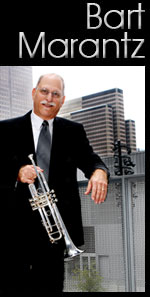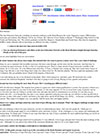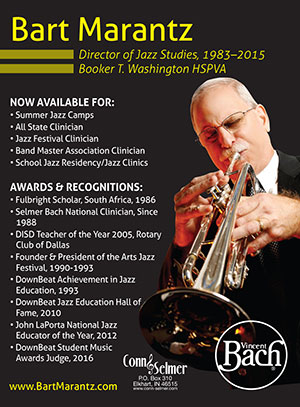 Home B.M.P. BTWHSPVA Articles Interviews Reviews Books Biography Videos Photos Calendar Music Links Contact Sara Marantz Matt Marantz Luke Marantz
Bart Marantz NPR/KERA Jazz Education Interview    Click below to listen to the interview  Click below to read the article 
|
Reviews "Blues for BJ" Written and Arranged By: John Edmondson Instrumentation: Big Band (Beginning Series) Publisher: QUEENWOOD/KJOS Grade 2 1/2 Medium/Up Tempo (Quarter Note) q = 152 $40.00 “Blues for BJ” is intended to be a first chart for young jazz artists. This original By John Edmondson features some stop time tutti sections as lead-ins for solos in the trumpet and sax sections. The piano is spot lighted prominently on solo fills at the appropriate times. The pieces final chorus is repeated and features a string of hemiolas (patterns of three in four-four meter) whose underlying harmonic structure is the only thing to remind the players where they are in the time signature. The tempo is a bright 152 beats per minute and should not be allowed to drag, especially in the spots where the rhythm section drops out. The melody is stated in unison the first time in the saxes. On the second chorus the brass take over the melody chores and the saxes play the fill-in-punctuation previously heard in the piano when the saxes played the melody. At measure 29 the saxes have a unison soil section leading to a trumpet solo or trumpet section soli depending on what the director thinks will fit the band best. This can be a challenge to your young students. At measure 41 the brass have a unison soli leading to a sax solo or again sax section feature. The rhythm section drops out for four measures each time, and great care should be given to keeping the time consistent. Be aware that this section starts on the second beat, where previously the sax unison started on the third beat. Observe all dynamic markings for contrast at measure 53 carefully for musical effect. The two unison drills at the end of the chart may be used for a warm-up in class. This is a very good way to introduce your young group to big band jazz music. This chart not only supplies solid ground for those wanting to perform big band music at an early age, but will also give each student a sense of accomplishment and direction. What better way to become a solid jazz player than the blues? John Edmondson takes it one step further by supplying an excellent arrangement for the young big band that will put these young artists on the accelerated plan if they are fortunate enough to get this excellent original Blues in their jazz ensemble book. Top note for trumpet is written D in the staff Bart Marantz |


